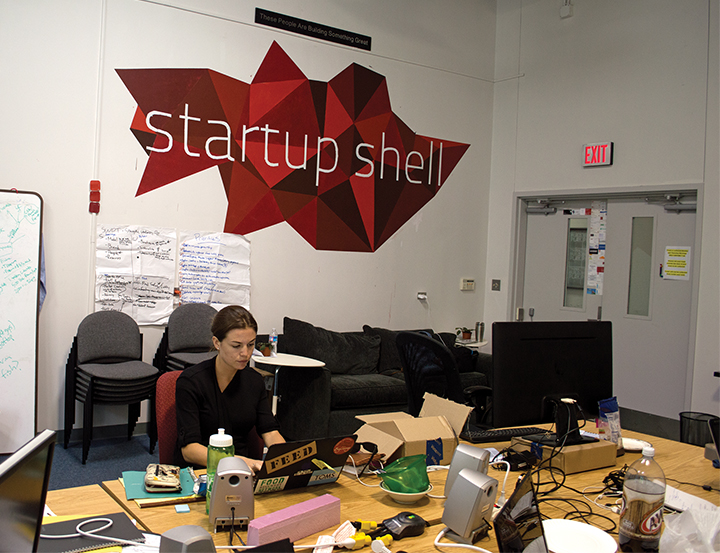In a hub of ideas, junior Eric Mintzer just had another one.
He sat before three connected screens in a small room filled with computers and couches, coffeemakers and cords. Red and green lights pulsed rhythmically through a coil of white tubing at his feet as he brainstormed; his eyes lit up from the excitement of creating something new.
“Imagine playing Pac-Man on the side of a building, with the actual contours of the building defining where you go,” said Mintzer, a junior management major.
Mintzer’s idea was for his company, Imaginex, which creates innovative, interactive 3-D light shows for nightclubs and music events. He created the company with junior accounting and economics major Anthony Ingelido out of the Startup Shell, a completely student-run startup incubator and registered nonprofit situated in the university’s technology advancement program building, near the Campus Farm. Home to about 40 students, the Shell offers 24-hour access to technological resources and a community of student expertise.
The Shell itself evolved from a simple idea, growing organically from the minds of students into its current hub of creativity.
“The whole idea behind it was there’s all these great resources on campus for student entrepreneurs,” said Eric Rosenberg, a 2013 university alumnus and one of the Shell’s founders. “But when it’s time to actually build your product or service, you’re sort of on your own.”
So Rosenberg, along with co-founder Justin Searles, a senior computer science major, started coming up with ideas for a “co-working space” based on a similar organization at Stanford University.
“I had about a dozen [friends] or so over to my house, had some beer, had a fire, and pulled out a whiteboard outside and brainstormed for the next two to four hours,” Rosenberg said.
The founders of the Shell approached Mtech Ventures directors Craig Dye and Dean Chang, who gave them a 700-square-foot room to make into their new home. The Shell accepted 10 students in the spring semester and 26 more this semester. Though anyone can work in the Shell, only official members have 24-hour access. Mintzer and Ingelido generally stay from 4 p.m. to 2 or 3 a.m. six days a week.
“I’ve lived here for two weeks straight,” Mintzer said.
To members, the incubator creates a community of student experts with knowledge to share. Shell members regularly lead educational “Shell Talks” on skills such as Javascript coding, 3-D printing and Google Glass.
Rosenberg created Route Rider, a mobile app that gives the whereabouts and arrival times of public transit buses.
“After learning about microprocesses and technology from people in the Shell, we brought that into our company,” Rosenberg said. “We built this prototype device that you can mount on the side of a bus and record in real time when someone’s getting on, getting off, where the bus is and what time it is.”
And when Mintzer needed help on a complex engineering topic, he didn’t need to go far: He found out what to do just by walking around the room and asking other students.
Other student businesses that grew out of the Shell include VentureBoard, an online platform for student entrepreneurs rated as one of the top 50 U.S. college startups by College Startup, as well as Parallel Tracks, which allows users to listen to the same music at the same time as selected celebrities. Another company, Evlove, sponsors online clothing swaps.
New ideas also include motorcycle helmets that would detect crashes and contact emergency services, a magnet-powered elevator and a biometric pillbox requiring fingerprint scanners to open.
Members hope to attract students from all kinds of disciplines, Searles said.
“There are people who don’t know the first thing about technology, but they’re brilliant and we want them in there,” he said.
In the Shell on Tuesday evening, junior government and politics major Alexander Florescu sat talking to Mintzer and Ingelido. It was his first day, and he didn’t have an idea yet. That wasn’t a problem, Mintzer told him.
“Just do something and try something,” Mintzer said to Florescu. “And if you don’t like it, do something else.”
Florescu was immediately attracted to the Shell’s idea of “making something for the world.”
“They just get things done,” he said. “There are a lot of people on campus who have great ideas but no one to approach to get some criticism.
“Everyone here is a potential teammate — I feel like I fit in.”
Members said the Shell’s culture and tight community were major draws. In the Shell, beanbag chairs and couches, art supplies, microwaves, inspirational posters and even a white Statue of Liberty holding a Terps foam finger lend the space personality.
The Shell’s slogan is “think, build, play,” giving credence not only to community and entrepreneurship but also to having fun, Mintzer said.
One night, a group of members spent about seven hours painting their logo on the wall, Searles said.
“We were just hanging out, blasting music, painting, being silly, climbing ladders, all that fun stuff,” he said.
Another time, 25 members spent the entire night building an Android app. And one Saturday night — or Sunday morning at 2 or 3 a.m., — Rosenberg was walking home and noticed a light on in the Technology Advancement Program building.
“I was like, ‘Oh, someone must have left it on; I’ll go turn it off,’” he said. “But it was 3 a.m. and there were like 10 people in there working on their companies. I was instantly proud.”
For student entrepreneurs who have struggled to balance classes and their companies, the Shell helps them “stay sane,” Searles said.
As students’ ideas grow, so does the Shell physically expand. This semester, it will tear down a wall and build into the next room, installing a prototyping lab in the room beyond that, said junior government and politics major Mackenzie Burnett. There are also tentative plans to create a collaborative, interdisciplinary space with the behavioral and social sciences college.
The Shell’s officials hope to engage in philanthropy, including a phone case campaign and mentorship of middle and high school students, Burnett said.
Looking forward, members describe the Shell in a single word: potential, said Luke Bittner, a junior materials science and engineering major.
“The space itself will grow. It’s going to be really good for UMD students,” Bittner said. “We want to keep its spirit because it’s an incubator for wonderful things.”
When students first moved into the room last year, they found just one decoration already on the walls: a sign, reading in modest black letters, “These people are building something great.”
It’s a philosophy they still hold today as they grow as a community, a nurturing ground for bright students armed with big ideas and determination to transform them into reality.
“Everyone who’s come by has been blown away by it,” Rosenberg said. “We love what we’re doing, everyone loves what we’re doing, and we want to see it grow as big as it can.”
Student Eileen Reavey does work for her campus organization, Food Recovery Network, in the Startup Shell headquarters.





